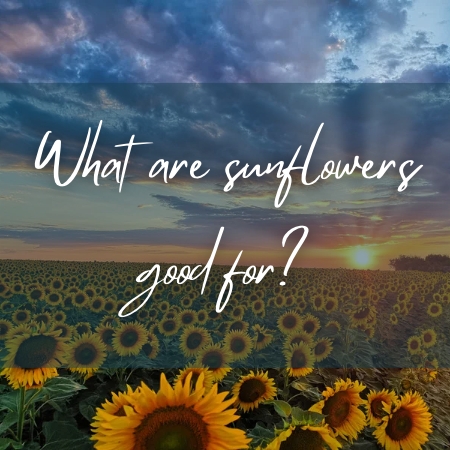Sunflowers are a useful permaculture plant to grow in your garden. They produce food, oil, nutrients, attract pollinators and beneficial insects, They clean soil, provide trellising stalks for peas, can be chicken fodder, and much much more!
Sunflowers are a useful permaculture plant to grow in your garden. They produce food, oil, nutrients, attract pollinators and beneficial insects, They clean soil, provide trellising stalks for peas, can be chicken fodder, and much much more!
Because the plant produces so many flowers, and so many seeds per flower, you don’t need to plant too many to get thousands of seeds in a harvest! Save some, eat some, leave some for the birds to eat during winter, and feed some to your chickens!

The sunflower sprouts are highly nutritious. In fact, the sprout is the most nutritious part of the plant! The sprouts are said to contain high amounts of protein, vitamin B, folate, and antioxidants. The seeds and their sprouts also contain vitamin E and vitamin C! These make a great snack for vegetarians and vegans!
Edible Sunflowers

Sunflower oil is another product which can be made from the sunflower plant. It can be used as a carrier oil for essential oils or in cooking meals. The process is usually done in a commercial facility, but it can be done in the home too. If you want to try at home you’ll want to start by dehulling the sunflowers and then grinding the seeds. Add a table spoon of water at a time to help with the grinding process. Finally you’ll need to extract the oil using a cold press method. Follow along with Onyx Food Hill here:
Sunflower for phytoremediation tool
In permaculture we like to use plants called “dynamic accumulators” to extract nutrients from down deep in the soil, and bring them up to the soil surface. These plants also accumulate other nutrients into the plant tissue too. Since sunflowers fall into this category, they are a great plant for cleaning contaminants from the soil! This can be really good of course, but it does outline the need for healthy soil if you intend to consume the plant! For detailed information on phytoremediation, download the PDF from the EPA here: https://www.epa.gov/sites/default/files/2015-04/documents/a_citizens_guide_to_phytoremediation.pdf
Using sunflowers to clean soil:
Attractant Plant
Sunflowers attract a number of beneficial insects. Some of these insects include ladybugs, bees, parasitoid wasps, and lacewings! Bees help to pollinate other plants and flowers, increasing your crop yield. Ladybugs eat aphids, asparagus beetle larvae, thrips, grape rootworms, spider mites, mealy bugs, whiteflies, and more! Parasitoid wasps lay their eggs inside of caterpillars and their larvae eat them from the inside out, making this a helpful wasp to attract to your garden! Lacewings eat aphids and other small soft-bodied pests! By growing sunflowers, you effectively attract natural predators to the pests that would otherwise be eating your garden. No sprays are required!

Chicken Food
Chickens love sunflowers and they benefit from the nutrient content of the seeds too. We love taking some of the dead sunflower heads and tossing them into the chicken yard for them to feast on. It’s so much fun to watch them enjoy and bicker over a giant sunflower head. They seem to find this to be quite a treat!
And Trellising Too?
Yes, trellising too! We also love to grow peas from the base of the sunflower stalks. Waiting until the sunflower is established, and its stem seems strong, poke a few pea seeds into the soil a few inches from the base. Peas are nitrogen fixers, which means they’re natural fertilizers! These peas will use the sunflower to climb and simultaneously provide the nutrients the sunflower needs to grow!
Not only are sunflowers beautiful, but they are a very helpful permaculture plant to grow and cultivate. They contain important nutrients in the plant and seed, soil contaminant clean-up, fodder for your egg layers, great companions, and they attract beneficial insects. Growing sunflowers is very rewarding. With their beautiful yellow petals trumpeting life, this tall flower builds resilience in your permaculture garden. Everyone should grow them.





